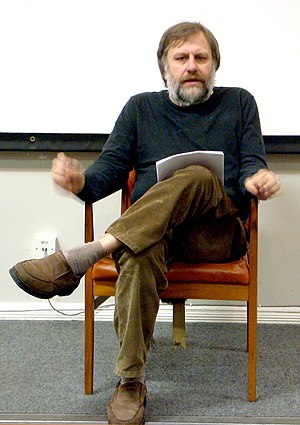So what mandate does the new government have? K-punk (in a wider, very good post) quotes Melanie Phillips saying that “no-one voted for a hung parliament.”
Before the election, there was a persistent rumbling around Gordon Brown’s legitimacy as PM (he didn’t win a general election) that seems strangely lacking around David Cameron – arguably less legitimate than Brown by the same arguments.
All of this demonstrates the dangers inherent in the way that the UK’s constitutional arrangements are reified into … well … a constitution. As the press coverage in the days following the election confirmed, our constitution appears to be whatever newspaper editors think that they would like it to be.
Dealing with this, K-Punk quotes extensively from an article by the Slovenian Marxist writer, Slavoj Žižek in which a similarly reified concept – the market – is debunked:
“Each individual perceives market as an objective system confronting him, although there is no objective market but just the interaction of the multitude of individuals – so that, although each individual knows very well that there is no objective market, just the interaction of individuals, the specter of ‘objective’ market is this same individual’s fact-of-experience, determining his beliefs and
acts. Not only market, but our entire social life is determined by such reified mechanisms……”
Continuing….
“Prosopopoeia is usually perceived as a mystification to which naïve consciousness is prone, i.e., as something to be demystified…. Dupuy recalls how sociologists interpret electoral results: for example, when the government retains its majority, but barely does so, the result is read as ‘the voters prolonged their trust into the government, but with a warning that it should do its work better’, as if the electoral result was the outcome of the decision of a single meta-Subject (voters) who wanted to deliver a ‘message’ to those in power.”
This helps us to look at the 2010 election afresh and determine what we actually know about it.
We know that it returned 650 MPs, all of whom received the largest number of votes in their constituencies (though many failed to receive a majority).
We know that every vote that those MPs received was cast for slightly different reasons and with slightly different levels of conviction. Many voters hadn’t made up their minds until they lowered their pencil onto the ballot paper. The day prior to the election, ITV’s polling told them that 38 per cent of the voters said it was “quite possible” they would change their mind before voting. Other polls at over 2.5 million voters as ‘undecided’ at the same point. If we had an electoral system that allowed people to divide their vote up in some way, we may have got a very different result indeed.
We know that many votes were cast ‘tactically’ – not for a candidate but against them. We also know (and I can’t remember where I read this*) that a lot of ‘tactical’ votes were cast stupidly – people either believed in ropey statistics or just didn’t research it properly and ended up voting for the third-strongest party on the ballot in a quest to stop the bookies favourite.
We know female viagra no prescription that every MP will have slightly different levels of allegiance to their party leader. I suspect that Charles Clarke or Frank Field would be fairly relaxed about having David Cameron as a PM if the alternative were Gordon Brown. On a much larger and profounder scale, we know that many people who voted Lib-Dem may have changed their vote had they known for certain that the Lib-Dems would go into coalition with the Tories. We just don’t know how many.
And so on. The reified election results mask a much more complex set of factors in which preferences were weighted, outcomes gamed and errors were compounded.
The only thing we know for certain is that those MPs that were returned got more votes than their strongest rivals and that is the only legitimacy that the whole election campaign bestows. Strangely – and sadly – the bizarre way that the British discuss their constitutional settlement consistently serves to mask this fact.
It’s a shame, because it’s the most attractive and defensible aspect of our constitutional settlement such as it is. It makes the case for a greater focus upon individual elected representatives and candidates and for a greater measure of independence for them once they’re elected.
*Tim Harford’s More or Less podcast during the election highlighted the way that parties misrepresented previous electoral statistics to dupe tactical voters into making the wrong choice.

















